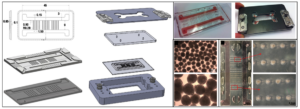Research Area: Biotecnologie Mediche
Group Leader

Prof. Cimetta’s main research interests focus on the application of engineering principles to biological studies. In particular, Prof. Cimetta’s laboratory specializes in the design and development of advanced microscale technologies and microbioreactor platforms (uBR) for the in vitro culture of cells. The ultimate goal of the research is the optimization of biological models and cell cultures for their application in clinical settings to develop and test novel drugs, therapies and therapeutic strategies.
Classically used cell culture approaches do not reproduce the complexity of the in vivo interaction between the cells and the dynamic microenvironment (uEnv), limiting the understanding of its precise role in biology. The engineering approach to biological studies brings several advantages over existing techniques since it allows exerting a precise and versatile control over the parameters characterizing a biological system. Microscale systems possess intrinsic characteristics such as small transport distances, small volumes handling, and the ability to introduce and measure fast dynamic changes in the soluble environment. Transport phenomena become more easily predicted and mathematically described and are amenable to computational modeling. These characteristics ultimately translate into the capability of allowing precise control and fine-tuning of variables in a large parameter space, thus providing rational approaches to the optimization of culture conditions and reducing the intrinsic variability of biological phenomena.
The need for innovative approaches capturing the complexity of the interactions between cells and their uEnv is particularly felt in the field of tumor biology, as tumors are extremely heterogeneous and capable of conditioning both the local uEnv and that of distant organs. Exosomes, small vesicles secreted by the tumor, are a fundamental form of communication between cancer and the surrounding environment, influencing a host of target cells locally and at a distance. In one type of cancer, Neuroblastoma (NB), exosomes seem to be particularly important; yet, current approaches to study their role in NB communication with local and distant μEnv fall short of providing clear answers.
Supported by an ERC Starting Grant, the main focus of the laboratory is now on the design and development of advanced microscale technologies and μBRs as in vivo-like systems to probe the role of Neuroblastoma-derived exosomes in cancer dissemination.
The laboratory will develop and implement advanced platforms, powerful means to enable highthroughput screening of environmental effectors of tumor behavior in a more realistic setting. Specifically, we will test gradients of NB derived exosomes on 3D cultures under different oxygen conditions aiming at defining how hypoxia influences physicochemical properties of exosomes and of target cultures. Finally, we will test long-range effects of NB derived exosomes on target tissues, metastatic sites of NB tumor. Notably, current members of the laboratory also acquired strong expertise in the establishment of NB organoids (3D culture) from tumor biopsies of the patients.
These technologies can bridge the gap between standard in vitro techniques and in vivo biological phenomena, providing a novel tool to understand certain aspects of cancer biology and ultimately advancing our understanding of NB.
Group Members
Maria Rosaria Esposito Lab Technician
Pina Fusco PostDoctoral Researcher
Lorenzo Bova PhD Student
Sara Micheli PhD Student
Luca Zanella PhD Student
Noemi Torriero PhD Student
Gaia Santi Research Associate
Selected Publications
Fusco P, Parisatto B, Rampazzo E, Persano L, Frasson C, Di Meglio A, Leslz A, Santoro L, Cafferata B, Zin A, Cimetta E, Basso G, Esposito MR, Tonini GP. Patient-derived organoids (PDOs) as a novel in vitro model for neuroblastoma tumours. BMC Cancer. 2019 Oct 21;19(1):970.
Reilein A, Cimetta E, Tandon NM, Kalderon D and Vunjak-Novakovic G . 2008. Live imaging of stem cells in the germarium of the Drosophila ovary using a reusable gas-permeable imaging chamber. Nature Protocols 14(8), pp. 2598.
Esposito MR, Binatti A, Pantile M, Coppe A, Mazzocco K, Longo L, Capasso M, Lasorsa VA, Luksch R, Bortoluzzi S, Tonini GP. Somatic mutations in specific and connected sub-pathways are associated to short neuroblastoma patients’ survival and indicate proteins targetable at onset of disease. International Journal of Cancer. 2018 Nov 15;143(10):2525-2536.
Fusco P, Esposito MR, Tonini GP. Chromosome instability in neuroblastoma. Oncol Lett. 2018 Dec;16(6):6887-6894.
Cimetta E, Sirabella D, Yeager K, Davidson K, Simon J, Moon RT, Vunjak-Novakovic G. 2013. “Microfluidic bioreactor for dynamic regulation of early mesodermal commitment in human pluripotent stem cell”. Lab on a Chip, 13(3): 355-64.
Contatti

Corso Stati Uniti, 4 F
35127 Padova
Phone: +39 049 9640111
Fax: +39 049 9640101
info@irpcds.org
Orario di apertura: lun-ven 8:30 – 17:30



